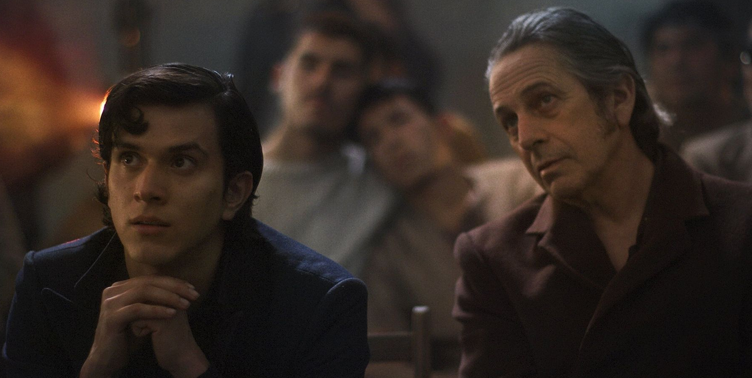“The Prince” (Spanish: El Príncipe) is a 2019 Chilean drama film, helmed by director Sebastián Muñoz and co-written by Muñoz and Luis Barrales. The screenplay is an adaptation of an obscure 1970s novel penned by Mario Cruz. Set against the backdrop of a prison cell in San Bernardo, Chile, around 1970, just prior to Salvador Allende’s presidency, “The Prince” delves into the complex themes of affection, loyalty among inmates, the exploration of sexual identity, love, violence, and the power struggles within the prison’s confines.
This compelling film had its world premiere in the Critic’s Week section at the 2019 Venice International Film Festival, where it earned the esteemed Queer Lion Prize. It was also chosen to compete in the Horizontes Latinos section of the 2019 San Sebastian International Film Festival.
Taking place within a Santiago prison during the year 1970, the film unfolds the story of Jaime, a youthful inmate sentenced for the brutal and mystifying murder of his closest friend. His life takes a pivotal turn when he crosses paths with “The Stallion,” an older and formidable prisoner who wields authority and respect within the inmate community. In a quest for protection, Jaime forges a connection marked by fondness and warmth with this man, unraveling profound emotions of love and the fundamental yearning for validation. Subsequently, assuming the moniker “The Prince,” he embarks on a journey of self-discovery regarding his sexual identity and the underlying reasons for his incarceration.
During its Venice premiere, a significant portion of the Italian specialty press responded positively to the film. Martina Barone of Cinematographe remarked, “It’s a film pulsating with unbridled sensuality. It’s disconcerting, with its intricate layers of sexual, emotional, and primal intensity.” Samuele Sestieri, in his review for PointBlank, described it as, “Chilean filmmaker Sebastián Muñoz’s debut, a mesmerizing ode to the complexities of love and mortality, dancing between pleasure and pain.” Carlo Valeri, writing for Sentieriselvaggi, saw it as “A claustrophobic yet desire-fueled piece, like a suffocating yet passionate final embrace before parting.”
By the festival’s conclusion, the film was honored with the Queer Lion award, celebrated for being, “El Príncipe, a passionate portrayal of life in a Chilean prison on the brink of Salvador Allende’s ascent to power in 1970. The harsh prison environment contrasts with the intensely emotional bonds among inmates. Anchored by the commanding presence of Alfredo Castro, the exceptional ensemble cast delivers powerful performances, portraying the paradoxical acceptance of same-sex connections in a prison setting at a time when it was socially taboo. Sebastián Muñoz’s directorial debut is a daring and erotically charged exploration of recent history that unveils an unexpected tenderness at its core.”
Following its Venice success and positive European reviews, the first American assessment came from Boyd van Hoeij of The Hollywood Reporter, a former Queer Lion juror himself. However, his review took a negative stance, summarizing the film as “a prison fantasy lacking in distinctive identity.”
| Directed by | Sebastián Muñoz |
|---|---|
| Written by |
|
| Based on | El principe by Mario Cruz |
| Produced by |
|
| Starring |
|
| Cinematography | Enrique Stindt |
| Edited by | Danielle Fillios |
| Music by | Ángela Acuña |
|
Production
companies |
|
| Distributed by | Storyboard Media |
|
Release dates
|
|
|
Running time
|
96 minutes |
| Country | Chile |
| Language | Spanish |

